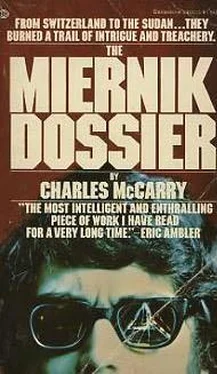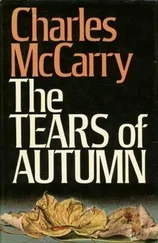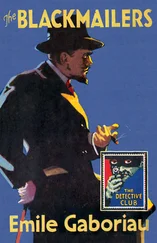2 June N.COLLINS
First Assistant
23. REPORT BY CHRISTOPHER.
Miernik’s distress is complete. His contract with WRO will not be renewed and the Poles will not reissue his passport. He came to my apartment just before midnight yesterday (2 June). I was in bed, reading, when the doorbell rang; it kept ringing until I opened the door. I was not surprised to find Miernik with his finger on the bell. Collins had told me earlier in the day what had happened to him, so I expected that he would turn up to discuss his problem.
Although his clothes are faultless-suit pressed and brushed, shirt clean, vest and coat buttoned, shoes shined-Miernik always manages to look disheveled. His thick body, the huge head set crooked on the shoulders, the big sad face with its strange nose and great hairy ears give him the look of an animal dressed up for a child’s tea party. He was sweating a lot and his breathing was audible, as if he had walked very fast up the fire stains.
Miernik began talking as soon as I opened the door. “I suppose you know the news,” he said. “Nigel informed me this afternoon. He called me into his office and shuffled his papers, which had my fate written across them. ‘My dear Miernik,’ he said, ‘I’m afraid it’s Poland for you. Really, I had to laugh-he seems to think my anxiety is a joke. Your friend Collins has another side you’ve never seen. When he is on duty he is as cold as a fascist. He treated me as a British district officer would treat a native. I asked him-very quietly, very calmly, Paul-if he had any idea what this meant to me. He raised his eyes to the ceiling. ‘Really, Miernik,’ he said, ‘you must try not to be so theatrical. The worst that can happen is that you’ll spend a short time in custody, and then you’ll be let out. Things will be back to normal for you in no time at all.’ A short time in custody! Things will be back to normal! His idea of hell is his public school.”
“Did he really call you ‘my dear Miernik’?”
“Of course he did. What else would he call me? When I lost my papers, and therefore my identity as a functionary of WRO, I crossed over into another existence. Nigel’s friend Tadeusz vanishes. Miernik the statistic takes his place. Before my very eyes I became a dossier. I no longer have blood. I become a paper man. I am what Nigel Collins and the other bureaucrats write on my new paper skin: Take away his passport. Put him in jail. Kill him.”
Miernik said all these things before he had advanced far enough into the room to reach a chair. I put a drink into his hand and sat down. There was no point in saying anything to him. He emptied his glass, which contained about four ounces of neat whiskey, in a single gulp-and let a tremendous fart.
His face reddened and he clubbed himself on the forehead with his fist. “Aaaah!” he cried, throwing his glass against the wall. “Even before a firing squad I would be a joke.”
Miernik opened a window and began fanning the air with a magazine to drive the smell he had made out of the room. I gave him another drink. “That’s not necessary,” I said. He went on fanning.
“I shouldn’t have got you up for this,” he said. “I’ll go away in a minute.”
“Stay as long as you like.”
His mouth opened in a grin, showing stainless steel teeth at the back of his jaw. “Are you offering to hide me in your attic like a Jew?”
I laughed. “If necessary.”
Miernik, still standing with his arms hanging loose, gave me a solemn look; his jokes never last very long. “You really would do that, wouldn’t you?” he said.
“I don’t think it’s come to that yet, has it?”
“No. I am not in Poland yet.”
“Maybe you never will be.”
“My dear Paul, what do you imagine I am going to do-ascend to heaven on a sunbeam?”
“There are more than a hundred countries in the world. Surely one of them will have you.”
“The U.S.A., for instance?”
“Anything is possible. Walk into the embassy and ask for asylum.”
“Wonderful. I will find some Nigel with an American accent who will make two telephone calls and advise me to go back to Poland, where, after a short delay of perhaps twenty years, I can once again lead a normal life.”
“I think you’re being a little hard on Nigel. It wasn’t easy for him to tell you what he had to tell you. Maybe he was just embarrassed.”
Miernik, scowling, shook his head. Even at the hour of his doom, his compulsive neatness took hold of him. He got down on all fours and began picking up the fragments of the glass he had thrown against the wall. He disappeared into the kitchen and I heard the glass fall into the wastebasket. When he returned he had regained his composure, though he was still breathing audibly, drawing his breath in through his nose. Even more than usual, he had the air of a man who is recovering from a mortal insult.
“My friend Paul,” he said, “I want to discuss this situation seriously. What am I to do?”
“Doing the obvious really is as impossible as you say it is?”
“The obvious? Returning to Poland?”
“Yes. Are you sure it would be so terrible if you did go back?”
“You sound like Nigel.”
“I suppose so. It’s hard to accept that they really want to destroy a man like you.
“A joke of a man? Believe me, they have no sense of humor.”
“They must know something about you that I don’t know.”
“They know things about me even I don’t know. They are artists, these secret police. They make a file. Into it they put their suspicions. To justify one suspicion they must find another, and another. The file gets fat. A thousand lies equal one great truth, just like a novel. When the dossier is fat enough, they send the man to the butcher.”
“How can you know that?”
“It’s natural for me to know it. I grew up in a society you cannot comprehend because it hasn’t happened to you Americans and English yet. You haven’t lived in the future as we Poles have done. From childhood, out there in the future, you learn two languages-one is heard with the ear, the other with the back of the neck. They are after me all right. I hear it here.” He touched the nape of his neck.
“You want me to help you.”
“How can you help me? You say yourself the Americans don’t want me.”
“I think there are easier countries for the citizen of a Communist country to get into right now, yes. I don’t think you’d have a chance with the people in the American embassy.”
“Then what can you do for me? Put a bed in your attic?”
“How would you like to go to Africa in an air-conditioned Cadillac?”
This was the first mention of the trip to Sudan I had made to Miernik. He treated it as a bad joke, and I was not surprised that he did so. It must have sounded like more American frivolity. He began to talk in a loud voice, going back to his own subject, refusing to hear me. Finally I managed to interrupt him.
“That was a serious suggestion,” I said. “Khatar’s father has bought a new Cadillac, and Kalash is going to drive it down to Sudan.”
“Drive it to Sudan?”
“Drive it to Naples, take ship to Alexandria, drive it down the Nile and across the desert. It will take about three weeks. Do you want to go?”
“On what date?”
“In about two weeks’ time, Kalash says. But you know Kalash.”
“I would have to go before my passport expires. That is July 2.”
“That means your passport will expire while you’re in Sudan. Do you want to be stateless in Khartoum?”
“Kalash could fix something,” he said. “Down there he is a royal highness.”
“Maybe you could be a slave. You’d come in handy if the old prince wanted to have a little talk with a Polish tourist.”
Читать дальше












